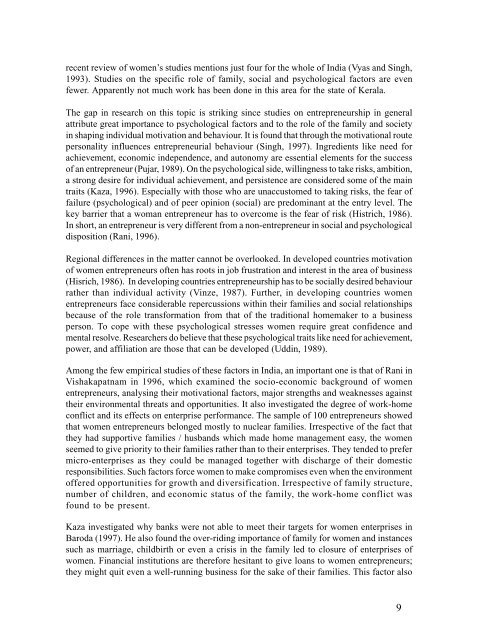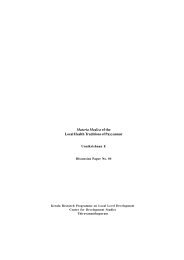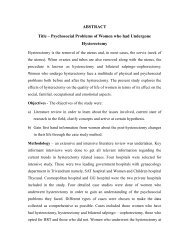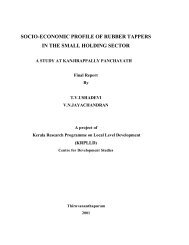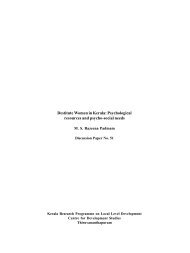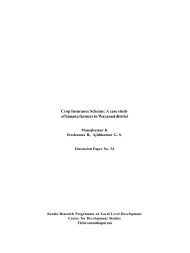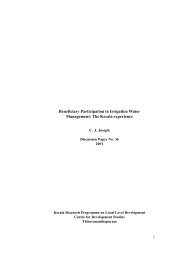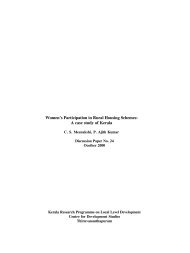Constraints on Women Entrepreneurship Development in Kerala: An ...
Constraints on Women Entrepreneurship Development in Kerala: An ...
Constraints on Women Entrepreneurship Development in Kerala: An ...
You also want an ePaper? Increase the reach of your titles
YUMPU automatically turns print PDFs into web optimized ePapers that Google loves.
ecent review of women’s studies menti<strong>on</strong>s just four for the whole of India (Vyas and S<strong>in</strong>gh,<br />
1993). Studies <strong>on</strong> the specific role of family, social and psychological factors are even<br />
fewer. Apparently not much work has been d<strong>on</strong>e <strong>in</strong> this area for the state of <strong>Kerala</strong>.<br />
The gap <strong>in</strong> research <strong>on</strong> this topic is strik<strong>in</strong>g s<strong>in</strong>ce studies <strong>on</strong> entrepreneurship <strong>in</strong> general<br />
attribute great importance to psychological factors and to the role of the family and society<br />
<strong>in</strong> shap<strong>in</strong>g <strong>in</strong>dividual motivati<strong>on</strong> and behaviour. It is found that through the motivati<strong>on</strong>al route<br />
pers<strong>on</strong>ality <strong>in</strong>fluences entrepreneurial behaviour (S<strong>in</strong>gh, 1997). Ingredients like need for<br />
achievement, ec<strong>on</strong>omic <strong>in</strong>dependence, and aut<strong>on</strong>omy are essential elements for the success<br />
of an entrepreneur (Pujar, 1989). On the psychological side, will<strong>in</strong>gness to take risks, ambiti<strong>on</strong>,<br />
a str<strong>on</strong>g desire for <strong>in</strong>dividual achievement, and persistence are c<strong>on</strong>sidered some of the ma<strong>in</strong><br />
traits (Kaza, 1996). Especially with those who are unaccustomed to tak<strong>in</strong>g risks, the fear of<br />
failure (psychological) and of peer op<strong>in</strong>i<strong>on</strong> (social) are predom<strong>in</strong>ant at the entry level. The<br />
key barrier that a woman entrepreneur has to overcome is the fear of risk (Histrich, 1986).<br />
In short, an entrepreneur is very different from a n<strong>on</strong>-entrepreneur <strong>in</strong> social and psychological<br />
dispositi<strong>on</strong> (Rani, 1996).<br />
Regi<strong>on</strong>al differences <strong>in</strong> the matter cannot be overlooked. In developed countries motivati<strong>on</strong><br />
of women entrepreneurs often has roots <strong>in</strong> job frustrati<strong>on</strong> and <strong>in</strong>terest <strong>in</strong> the area of bus<strong>in</strong>ess<br />
(Hisrich, 1986). In develop<strong>in</strong>g countries entrepreneurship has to be socially desired behaviour<br />
rather than <strong>in</strong>dividual activity (V<strong>in</strong>ze, 1987). Further, <strong>in</strong> develop<strong>in</strong>g countries women<br />
entrepreneurs face c<strong>on</strong>siderable repercussi<strong>on</strong>s with<strong>in</strong> their families and social relati<strong>on</strong>ships<br />
because of the role transformati<strong>on</strong> from that of the traditi<strong>on</strong>al homemaker to a bus<strong>in</strong>ess<br />
pers<strong>on</strong>. To cope with these psychological stresses women require great c<strong>on</strong>fidence and<br />
mental resolve. Researchers do believe that these psychological traits like need for achievement,<br />
power, and affiliati<strong>on</strong> are those that can be developed (Udd<strong>in</strong>, 1989).<br />
Am<strong>on</strong>g the few empirical studies of these factors <strong>in</strong> India, an important <strong>on</strong>e is that of Rani <strong>in</strong><br />
Vishakapatnam <strong>in</strong> 1996, which exam<strong>in</strong>ed the socio-ec<strong>on</strong>omic background of women<br />
entrepreneurs, analys<strong>in</strong>g their motivati<strong>on</strong>al factors, major strengths and weaknesses aga<strong>in</strong>st<br />
their envir<strong>on</strong>mental threats and opportunities. It also <strong>in</strong>vestigated the degree of work-home<br />
c<strong>on</strong>flict and its effects <strong>on</strong> enterprise performance. The sample of 100 entrepreneurs showed<br />
that women entrepreneurs bel<strong>on</strong>ged mostly to nuclear families. Irrespective of the fact that<br />
they had supportive families / husbands which made home management easy, the women<br />
seemed to give priority to their families rather than to their enterprises. They tended to prefer<br />
micro-enterprises as they could be managed together with discharge of their domestic<br />
resp<strong>on</strong>sibilities. Such factors force women to make compromises even when the envir<strong>on</strong>ment<br />
offered opportunities for growth and diversificati<strong>on</strong>. Irrespective of family structure,<br />
number of children, and ec<strong>on</strong>omic status of the family, the work-home c<strong>on</strong>flict was<br />
found to be present.<br />
Kaza <strong>in</strong>vestigated why banks were not able to meet their targets for women enterprises <strong>in</strong><br />
Baroda (1997). He also found the over-rid<strong>in</strong>g importance of family for women and <strong>in</strong>stances<br />
such as marriage, childbirth or even a crisis <strong>in</strong> the family led to closure of enterprises of<br />
women. F<strong>in</strong>ancial <strong>in</strong>stituti<strong>on</strong>s are therefore hesitant to give loans to women entrepreneurs;<br />
they might quit even a well-runn<strong>in</strong>g bus<strong>in</strong>ess for the sake of their families. This factor also<br />
9


